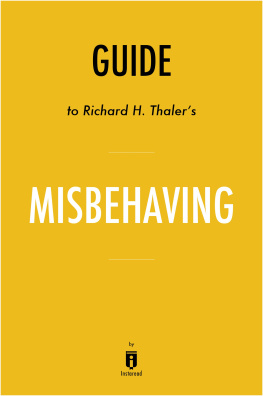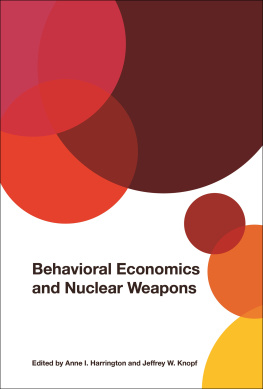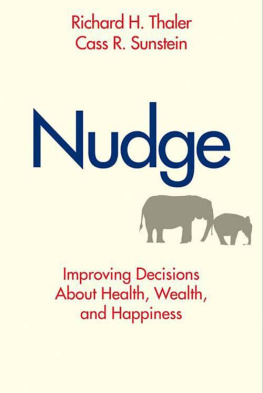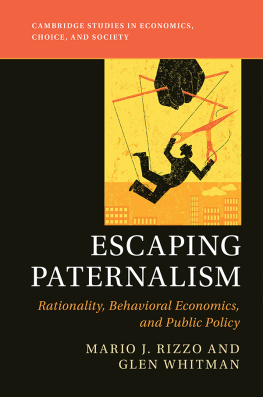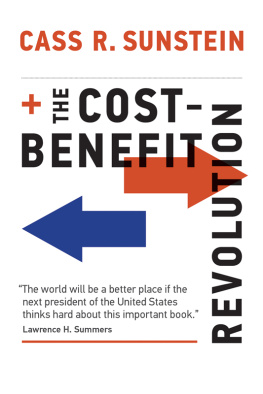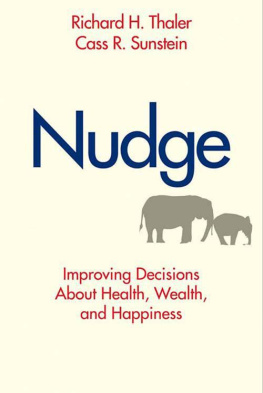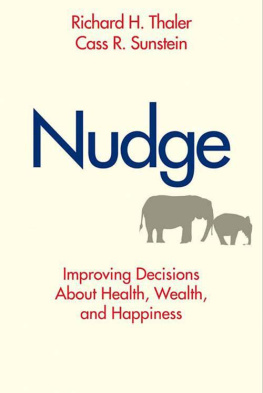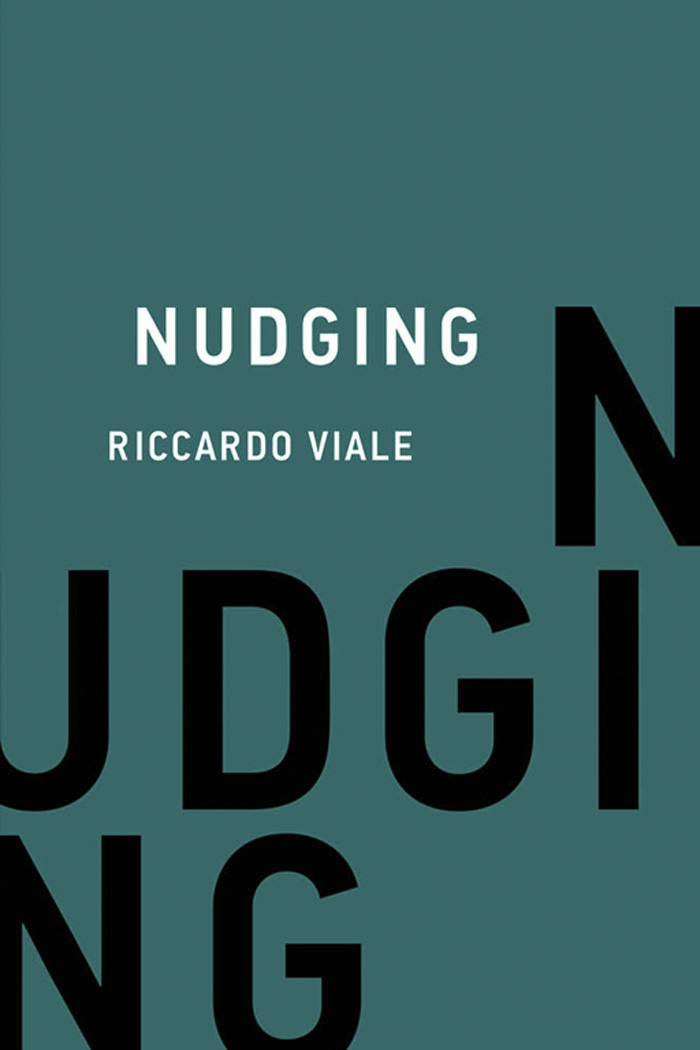
Nudging
Nudging
Riccardo Viale
The MIT Press
Cambridge, Massachusetts
London, England
2022 Massachusetts Institute of Technology
All rights reserved. No part of this book may be reproduced in any form by any electronic or mechanical means (including photocopying, recording, or information storage and retrieval) without permission in writing from the publisher.
The MIT Press would like to thank the anonymous peer reviewers who provided comments on drafts of this book. The generous work of academic experts is essential for establishing the authority and quality of our publications. We acknowledge with gratitude the contributions of these otherwise uncredited readers.
This book was set in ITC Stone Serif Std and ITC Stone Sans Std by New Best-set Typesetters Ltd.
Library of Congress Cataloging-in-Publication Data
Names: Viale, Riccardo, author.
Title: Nudging / Riccardo Viale.
Description: Cambridge, Massachusetts : The MIT Press, [2022] | Includes bibliographical references and index.
Identifiers: LCCN 2021051210 | ISBN 9780262544443 (hardcover)
Subjects: LCSH: EconomicsPsychological aspects. | Human behavior.
Classification: LCC HB74.P8 V53 2022 | DDC 330.01/9dc23/eng/20211209
LC record available at https://lccn.loc.gov/2021051210
10987654321
d_r0
To Caterina, my daily boost to awareness
Contents
The fundamental role of the cognitive sciences in studying public administration and in supporting government decision-making was not recognized until the publication of Nudge. Although the first seminal study in behavioral public administration and government was published by Herbert Simon in 1947, it had little impact on political awareness of the utility of behavioral tools to better improve public policy making and organization. In the decades that followed, much research and many publications on the same topics appeared, all of them meeting with a similar lack of impact. The idea of the nudge represents a Copernican revolution in the role of the cognitive sciences, and in particular behavioral economics, in public policy making, thanks in part to the institutional recognition supplied by the Obama administration in the United States and David Camerons cabinet in the United Kingdom (2009 marked the beginning of its application to policy in both the United States and United Kingdom). Nudging is a reflection on the pros and cons of the paternalistic libertarian apparatus of nudges at work, and ideas for alternative behavioral approaches to public policy making that would be able to bolster individual autonomy and deliberative decision-making.
I owe my greatest intellectual debt to two prominent figures of the twentieth century, whom I was lucky enough to meet and whose teachings shaped my Weltanschauung: Sir Karl Popper, with his critical approach to knowledge and the concept of piecemeal social engineering; and Herbert Simon, with the theory of bounded rationality.
There are many other people to whom I owe a debt of gratitude for their input to this work. In particular, I would like to thank Gerd Gigerenzer for his fundamental contribution to bounded rationality and decision-making. Moreover, I wish to thank Cass Sunstein, Ralph Hertwig, Denis Hilton, Peter Todd, Joe Stiglitz, Hersh Shefrin, Laura Martignon, Max Bazerman, Shabnam Mousavi, Eric Johnson, Ulrich Hoffrage, Barbara Fasolo, Adam Oliver, Cristina Bicchieri, Michael Norton, Laura Macchi, Umberto Filotto, Umar Taj, Rino Rumiati, Giovanni Dosi, Shenghua Luan, Faisal Naru, Emanuele Ciriolo, Giacomo Sillari, Nicolao Bonini, Matteo Galizzi, Pete Lunn, and Antonio Roazzi for their suggestions and critical remarks about my ideas on nudging and behavioral economics.
Precious juridical and institutional insights complementing my ideas came from Justice Giuliano Amato and Sabino Cassese, whose perspectives encompass the most relevant aspects of behavioral public policy.
I am grateful for the constructive discussions after my lectures at the Behavioral Insights Group at Harvard University; Max Planck Institute of Human Development, Berlin; Behavioral Ethics Laboratory at the University of Pennsylvania, Philadelphia; OECD, Paris; Kings College, London; Italian Academy and Department of Psychology at Columbia University, New York; Institute of Psychology at the Chinese Academy of Science, Beijing; and Saint Hildas College, Oxford.
My thanks go also to the public managers of the classes in behavioral public policies and administration at the National School of Government of Rome (20022015), at the Agency of Social Inclusion and Development of Rome (20172020), and at LUISS, Rome (20152020); and to my students in the classes in behavioral economics at University of MilanoBicocca for many fruitful discussions about nudging.
Some of the ideas for this book are the result of research conducted with Behavioral Insights Bicocca, Milan; and the Cognitive Insights Team, Turin. I wish to thank Veronica Cucchiarini, Valeria Castoldi, Laura Caravona, Marco Fasoli, and Federico Perlino for their valuable inputs and precious collaboration. I am also grateful to Elisabetta Nay and Giovanni De Rosa for their organizational support.
The recently established Italy Behavioral Insights Team (IBIT) at the Department of Civil Service in the Italian government has started to analyze some of the topics presented in this book. I wish to thank the members of IBIT, in particular Marco De Giorgi, Sveva Batani, Davide Pietroni, Silvia Felletti, Flavio Urbini, Rosaria Giannella, Antonio Affuso, and Gianfranco Becatti for their suggestions and collaboration.
This book refers to a series of my previous articles, and in particular to Oltre il nudge, published by Il Mulino (Bologna).
I wish to thank Sarah Cuminetti for her valuable contribution in the form of editorial review and English revision.
I am grateful to the Herbert Simon Society and to Collegio Carlo Alberto of Turin for the financial support in the production of this book.
I thank Philip Laughlin of MIT Press for his support to the publication of this book.
Finally, I would like to acknowledge my children Lucia, Vittoria, and Tancredi and my mother as the precious source of inspiration about many behavioral aspects of daily life.
This book is dedicated to the memory of Denis Hilton, beloved friend and smart colleague, who left us way too early.
Riccardo Viale
June 30, 2021
La Chiusa
Galatina-Lecce (Salento)
Italy
Behavior and Power
Frank Babetski is a leading CIA analyst who also holds the analytical tradecraft chair at the CIA University. Babetski regards Daniel Kahnemans Thinking, Fast and Slow as a must-read for all intelligence officers. it is possible to push the individual to choose in a way that is desirable to the policy makerarchitect. This, of course, while safeguarding the interest of the citizens, as any government is expected to.
The response to Kahnemans two master classes was substantial. In fact, it exceeded all expectations as the commercial potential of behavioral knowledge dawned on Silicon Valley. Meanwhile, John Kenny, a great decision-making expert, had noted that it was impossible to understand the commercial success of digital platforms like Amazon, Facebook, Nike+, Groupon, or FarmVille without taking into account the principles of behavioral economics. To Kenny, this knowledge and the related behavioral insights would become the driving force behind the digital marketing strategies of the future. To be sure, in 2012 Facebook launched an experimental test to gauge the effect of emotional priming on a sample group of 700,000 users. A few years later, in April 2015, in a letter to Amazons shareholders, Jeff Bezos explicitly mentioned a program that would generate a constant flow of nudges (70 million per week) through machine learning. By then, companies all over the world had set out to unpack the enormous amount of information contained in big data to come up with behavioral generalizationswith reference to consumption, but also to culture and politics.
Next page

